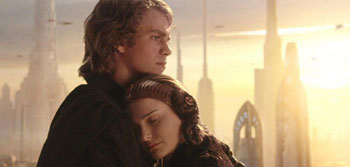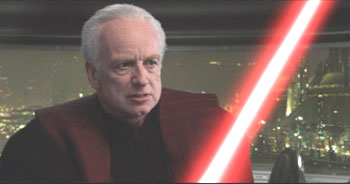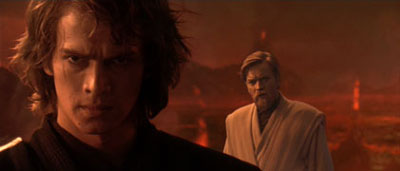|
Well, it looks like George Lucas took my advice and decided to make a better film this time-that's right, my advice, and mine alone. Revenge of the Sith gives us a flick that actually feels like a bona fide Star Wars film after two lukewarm attempts at doing so, and it's nice to have more to enjoy than to criticize, since most of us don't really want to pay for the privilige of anticipated future bitching. We do enough of that for things that life hands us free of charge as it is.  Is it as good as classic Star Wars? No, though not for any real faults of its own. The problem lies mostly in the fact that the two previous films did a less-than-effective job of properly establishing and making us care about this cast of characters. Given that, it surprising at just how well this film works anyway. Looking at it, it seems as though there very well could've been just one prequel film made, and everything would've turned out just as well. All the important backstory issues happen in this one movie. We might not have known about Anakin's badass racing skills or where the stormtroopers came from, or you know, how Boba Fett got his suit, as if it mattered, but damn near everything that counts takes place in this final installment, including scenes that really should have been in the last film but weren't due to some passing form of insanity on the part of George Lucas. All of the cool scenes of Palpatine seducing Anakin to the dark side happen here, plus we actually get to see Anakin and Obi-Wan acting like friends instead of constantly sniping. The action scenes kick. There's no inappropriate or badly misplaced humor. There's actual character drama. Hell, there's actual characters. I wish George could've hit his stride a little earlier; had this film come on the tail of two other films that had done a good job of making us feel involved with the cast, this film would've been amazingly intense. As it is, it must compensate for all that prior lack within its own running time, and does so rather admirably well. After watching Jar Jar step in shit and seeing Anakin ride a giant tick in previous installments, we at last come to the part we actually wanted to see: the fall of Anakin to the dark side, the rise of Palpatine and the destruction of the Jedi and the old Republic. We get the final conflict between Anakin and Obi-Wan, the birth of Luke and Leia, and even a dramatic face-off between Yoda and the Emperor. No time is wasted here. Though the first half of the film, after the dramatic opening action sequence, at least, is much slower than the rest of the film, it's slow in the same way that the first half of the original Star Wars was slow, i.e. it doesn't matter that people aren't blasting or hacking at one another the entire time, since the plot events occurring during that time actually matter. And while still not exactly golden-tongued, Lucas does a better job with the dialogue this time around, even in the love scenes. He does still flirt with borderline cheese, but doesn't throw an entire wheel of Gouda at us like before. There's still a lamentable lack of fun, quotable dialogue abounding, but the irony and timeliness of Padme's observation that "This is how liberty dies: with thunderous applause" makes it, for me at least, probably the best damn line in the entire saga. Anakin's swing to the dark side, though just a bit abrupt, is well dealt with, showing the real tragedy of the character: a man who wants to do good, but who has no real idea what "good" even is. It makes quite a good case, whether it means to or not, against organized religion for its exceedingly unhelpful viewpoint that "good" is defined as "following the rules of the church/sect/cult leader/holy book" as opposed to any objective sense of why morality is even necessary. Anakin is looking for a leader to point the way for him, and follows the one who treats him with actual respect, instead of the ones who respect life in general. The Jedi, interestingly enough, aren't all perfect and pure of wisdom, and do a good job of driving Anakin away with their own oft-unreasonable standards of perfection, while the cackling, lightning-blasting villain actually makes some well-reasoned arguments.  The acting seems uniformally better this time around, with the off and on exception of Hayden Christensen, who just can't sell anything approaching subtle. He's better here than in Attack of the Clones, partly because the character is written better this time around, as well, but while his average dialogue bits are decent enough, his attempts at rage and defiance tend to be bombastic and unconvincing. It sticks out particularly badly in his scenes with Ewan McGregor, who finally nails the character of the young Obi-Wan perfectly, after two films of being handed a character with no real point or personality. Natalie Portman does well enough in her limited role, though she's sadly given rather little to do besides sit around her apartment (though the scene of hers and Anakin's long stare across the miles is one of the more artful things Lucas has attempted in the series). It's as if George had simply run out of things to do with her by this point, much as he had done with Leia by Return of the Jedi, where he settled for just putting her in a bikini for lack of anything better to use the character for. I must, however, make special mention of Ian McDiarmid's performance as Palpatine as the stand-out acting job of the piece. He plays the role of Chancellor with subdued dignity and refinement, and when his guise has fallen, he plays the Emperor with the same over-the-top cartoonish excess he did in Jedi; it's quite amusing. There are problems, of course. Plotwise, the fact is that Padme's fate is completely irreconcilable with Leia's supposed recollection of her real mother as related in Return of the Jedi. Darth Vader spreading his arms and bellowing "NOOOOO!" as the camera pulls back is unintentionally funny, seeming almost like a parody of itself. The trademark use of wipes as scene transitions sometimes imparts a herky-jerky stop-start feel, especially in the earlier and/or shorter scenes where a simple cut or dissolve might've better maintained the flow. Like most filmmakers, Lucas appears to have no idea whatsoever just how hot lava really is. The matter of Anakin and Padme's marriage having been secret is ultimately of no real importance; no one who would mind ever finds out anyway. And, finally, there's the matter of Jar Jar Binks, Lucas' most famous failure, who appears for a scant few seconds and utters two whole words in the film (a very quiet "excuse me" right near the beginning). Seeing him again near the end is almost startling, a sort of "Oh yeah, that guy. I'd totally forgotten about him." After clearly expecting him to be the runaway new fave character, Lucas got stuck in a bad spot where he couldn't make people like him as a hero, couldn't give him a tragic sendoff due to the fact that no one would find it tragic, and had to settle for just ignoring him completely, which, whether you like the character or not, feels like a cop-out. I have to wonder what role he'd intended for Jar Jar to have filled had public opinion gone differently; it is, after all, hard to imagine a film this dark in tone having a malaprop-spouting frog with a high-pitched Muppet voice doing anything that wouldn't just knock you right out of the drama. Perhaps the noble experiment was doomed to failure no matter what the audiences had thought.  As an aside, I have to wonder if Liam Neeson really hated working on Phantom Menace and refused to return as a Jedi spirit in future installments. It seems to have been an important matter that he be able to speak from the great beyond as Obi-Wan did in the original trilogy, but here it's handled merely with a quick say-so from Yoda, and in Attack of the Clones his contact with Yoda through the Force is achieved via recycled soundbites from Phantom. I'm sure there's some fascinating story behind all of this.... Certainly, Revenge of the Sith is the most depressing film in the series, even if we know things will ultimately turn out all right in the end. Though it's technically Anakin's story, we empathize mostly with Obi-Wan, a man put in a truly terrible position and forced to do things has clearly hates to do in order to try and put things right. It makes one wonder, more than anything else in the six-film series, just how believable it is that Darth Vader/Anakin Skywalker is a redeemable person. In the first trilogy, we knew Vader was bad, but his evil was largely impersonal and detached. Seeing him commit multiple murders with no qualms and then go home to his wife and sincerely attempt to reassure her that things will be fine is much more disturbing than any planet-pulverizing death-ray action. This is where Sith succeeds: it finally makes us want to discuss issues of character and ethics, and not issues of the quantity of scatological humor or whether Yoda was better as a puppet or CG creation. It makes the world of Star Wars alive again, and all I can say is better late than never. -review by Matt Murray
|
|
||||||||